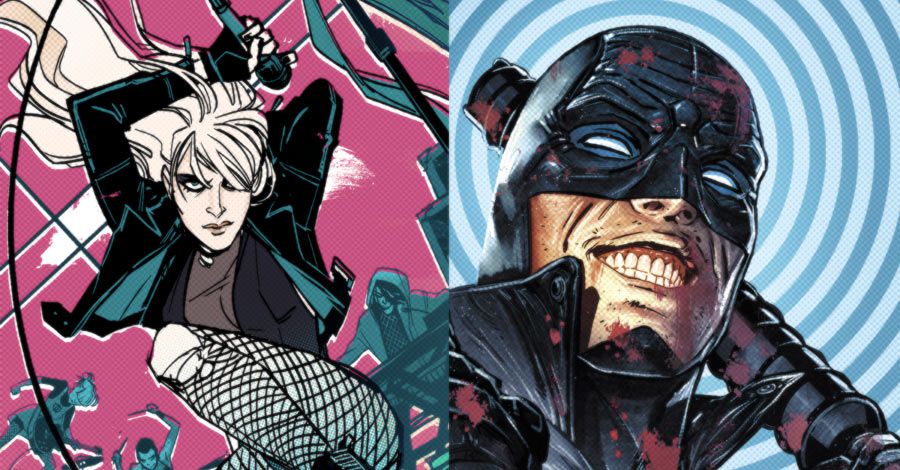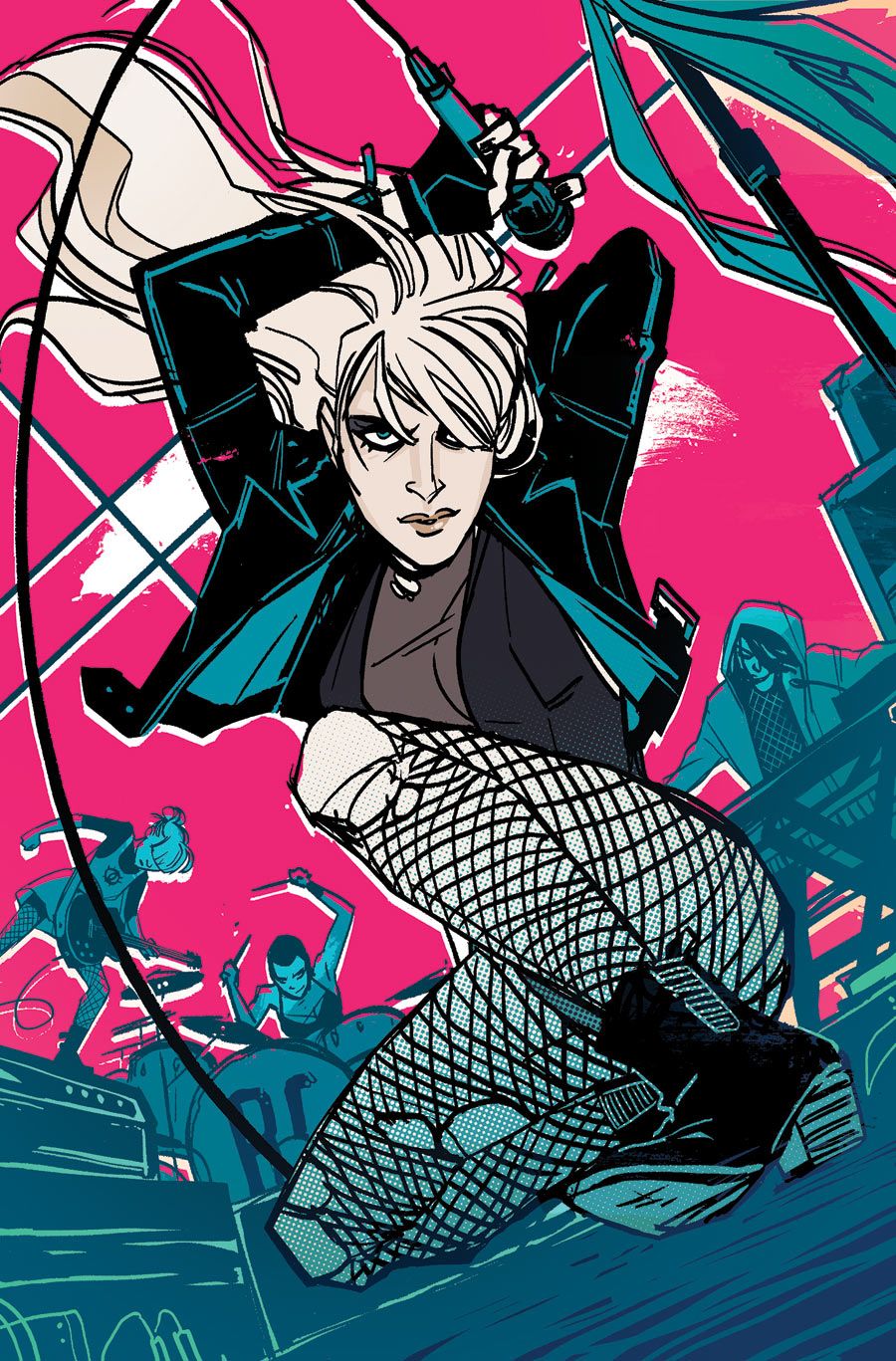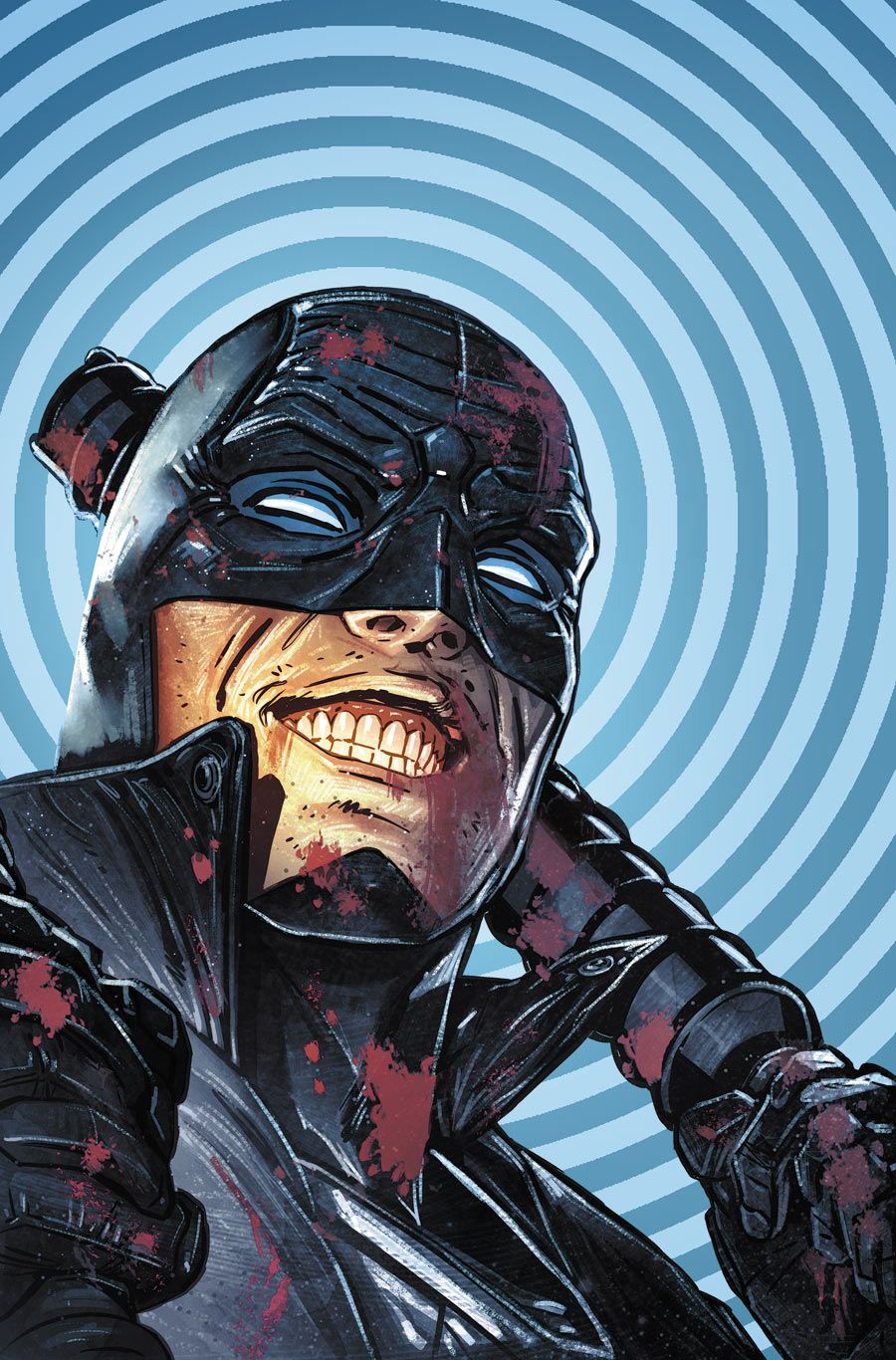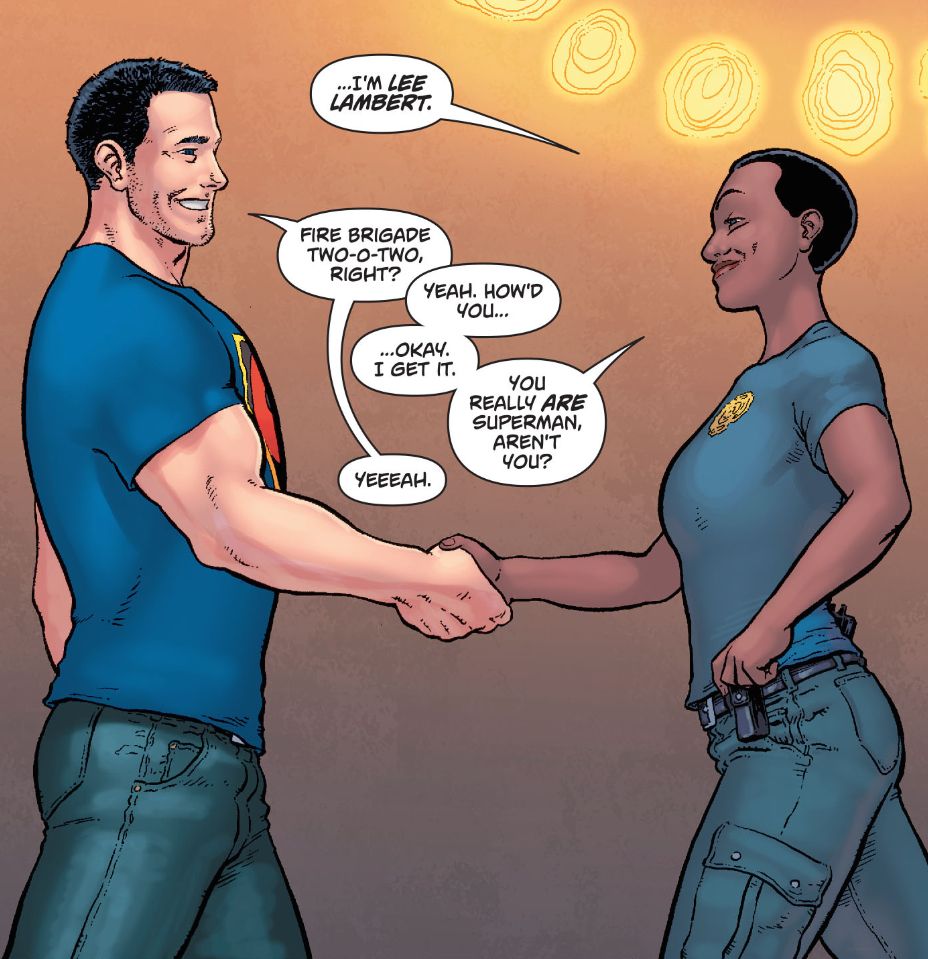There's a lot to be negative about when it comes to comics. It's easy to be annoyed by things nowadays because social media has given people a platform to shoot off incredibly dumb comments and a tool with which to take those comments to task. I'm using that preface to say that while there were definitely a few logistical things I could grumble about regarding this past weekend's Special Edition: NYC convention, I would rather focus on something that I thought was really cool, really progressive, really natural and really indicative of how far the comics community has come in the past few years. I wanna talk about panels.
Of course there was a whole lot of justified negatively about convention panels just a few weeks ago when a bunch of guys at Denver Comic Con decided to do a Women In Comics panel without any, you know, women. Insult was added to headdesk injury when people realized that Trina Robbins, a female comics historian/creator/expert was actually at DCC and appearing on other panels. Come on, really?
Keeping in mind that -- like narwhals -- all-male "women in comics" panels are a thing that defy logic yet do exist, I want to bring up how remarkable SENYC's panels were. The panels specifically devoted to diversity and general comic culture ones featured panelists outside the straight-white-male type. This didn't feel out of the ordinary and I didn't even realize this until Sunday, day two of a two-day con; it took looking in on a panel featuring zero male panelists and realizing that the topic wasn't "Women In Comics" for me to realize how refreshing the panels were at this show. That panel, by the way, was "Creating Comics: The Real Stories" and featured Marguerite Bennett, Dylan Meconis, Katie Cook, Kate Leth, Annie Wu, Becky Cloonan, Marjorie Liu and Jill Pantozzi.
SENYC: Batman Writers Bring Dynamic Action To Gotham
An all-female panel where the focus isn't just being a woman in the industry is both a rare and powerful thing. Women in Comics panels can be great; the vibe of those panels is usually celebratory with a side of camaraderie. But there's always one question that gets asked at those panels: why aren't there more women on the main Marvel and DC panels? That problem was not present at SENYC, specifically where DC was concerned. The five members of DC's Batman panel had two women -- Becky Cloonan and Genevieve Valentine -- on it; additionally, the main, all-encompassing DCU panel had a 50/50 gender balance with its lineup of Ming Doyle, Annie Wu, Becky Cloonan, Brenden Fletcher, Steve Orlando and Greg Pak -- and that panel also contains creators of color and varied orientations as well. On top of all this, SENYC also featured panels with the inclusive title "People in Comics" and another on transgender themes in comics.
It's not like SENYC attracted a different set of creators, though; I see Ming Doyle and Annie Wu and Becky Cloonan at almost every show I go to. The reason this show felt different is because both DC and Marvel have made considerable strides in both diversifying their titles and creators over the past year. Everyone on this year's DC panel -- other than Greg Pak -- are just now starting runs on DC books. There's definitely still room for improvement, but what I saw at SENYC gives me hope that the big superhero panels at conventions won't just be filled with bearded white guys.
I believe that the diversification of those big two panels, in addition to the continued existence of more diversity-focused panels, is integral to the growth of the comic book industry. Speaking specifically to the general DC Comics panel, I saw a lot of young fans in the audience. Not only did those kids learn that there are female heroes like Black Canary and gay vigilantes like Midnighter, they also saw that women write and draw comics. They just do; it's an undeniable fact and it's one these kids are getting exposed to early. Any convention panel I could have gone to when I was there age would have been all dudes and further perpetuated the dumb notion that superheroes are dude things.
All that being said/written, there's only so much insight I can give as someone that just watched these panels. Not only do I not know what it's like to be a person of color or a woman, I don't know what it's like to pitch and run a panel at a convention. To give real insight into what went down at Special Edition: NYC, I reached out to two people that ran diversity-themed panels at the show. MizCaramelVixen is the founder and dean of VixenVarsity, a lifestyle site with a heavy focus on diversity in comics; MizCaramelVixen played an instrumental part in the #SaveStorm movement and started the #BlackComicsMonth movement, which had its first ever panel at SENYC. Daisy Rosario is a producer for NPR's Latino USA; she produced the fantastic Diversity in Geekdom series for NPR and ran the panel "Representation Beyond Characters: How Diversity Bleeds into Work." Here's what they had to say about the weekend.
Brett White: What inspired you to submit your panel to Special Edition?
MizCaramelVixen: I wanted to take #BlackComicsMonth to the next level, from week two back during February. I knew that there was something there that people wanted, due to the success of #BlackComicsMonth, and I believed that a #BlackComicsMonth "tour" would be the way to spread the "gospel." Problem with the so-called "tour" was money, so I figured that I should wait 'til a convention near where I live opened up their panel submissions, and I applied. Special Edition: NYC was the "test market" so to speak.
I honestly thought that I would have maybe 15 to 20 people at the panel. Imagine my surprise when there were only a few seats left out of 360 along with people standing in the back; it was surreal. I didn't look into the crowd too much as I was afraid I'd break down in tears, due to the overwhelming ocean of the diverse audience, it was still a beautiful sight to behold. Knowing that everyone in the audience received at least two diverse comic titles along with some prints -- thanks to creators, publishers and a comic book store -- was just so perfect. I'm still floating on cloud nine.
The panel that I assembled: Valentine De Landro ("Bitch Planet"), Alitha Martinez ("Foreign"), Greg Pak ("Storm"), Kim Gaines ("Eventide") Skuds McKinley ("Plunder") and Che Grayson ("Rigamo") were, what I thought, the perfect mix until I received an email that legitimately had me in shock. ReedPop contacted me to let me know that Darryl "DMC" McDaniels had requested to be on my panel. When I read the email, I had to read it over three times -- once out loud because I thought I was losing my mind. After reading it to myself, I had to Google the name because, in my mind, there was no way the person who I thought the email said was said person. Yeah, I was wrong. "DMC" from the hip hop group Run-D.M.C., the group that I grew up with wanted to be on my panel. Shut not just the front door, but every door.
Not only was DMC added to the panel, I wanted another woman of color on the panel and I found the fantastic Amy Chu who agreed in seconds to appear on the panel. A panel of eight, turned into a panel of nine when freaking Brian Michael Bendis appeared about 12 minutes into the panel. I never thought he would actually make it, even though I invited him via Twitter. Having him say he "moved heaven and Earth to be there" was just amazing. All I wanted to do was to assemble a panel that would showcase diversity and bring forth awareness and it ended up being one of the most talked about panels there and ended up trending on Twitter the same day.
Blessed.
Daisy Rosario: The conversation around diversity in comics is ongoing and important, but as someone who interviews people for a living, I felt there were a couple of unexplored angles. My panel focused more on world-building and fleshing out characters. It's something I think a lot about in terms of journalism as well, since that's what I do.
With journalism, I think diversity isn't just about covering diverse people and having more journalists of different backgrounds -- or in the case of comics, creating diverse characters and having diverse creators. It's also about how you present those people and characters. And, with both journalism and comics, it's also about what stories you choose to tell.
For my panel, it was important to me to have a mix of people who had done indie work and written major titles so we could get the perspective of how they approach being mindful of diversity when they can do whatever they want and when they are working within the parameters of an established character. That allowed me to ask the questions I wanted to ask and make sure we were contributing to the diversity conversation in a meaningful way. [Ed. Note: The panel included Amy Chu, Edgardo Miranda-Rodriguez, Greg Pak, Alitha E. Martinez, Valentine DeLandro and Kim Gaines].
I got so excited when I saw that "Batwoman" used the, I guess you'd call it a Mexican folk tale, "La Llorona." So there are lots of ways to be inclusive.
Were there any points that a panelist made that you think everyone needs to read?
MizCaramelVixen: Here are some of my favorites that definitely need to be shouted from the rooftops.
"We can't just represent one viewpoint anymore." - Amy Chu
"Diversity is not being afraid to talk about what everybody's afraid to talk about" - Darryl "DMC" McDaniels
"You can't tell me no, I'm already doing it." - Che Grayson on adding diverse characters in her comic.
"We are all standing on the shoulders of the Milestone [Comics] creators" - Brian Michael Bendis
"Keep the cast [of comic characters] as diverse as the world I live in." - Greg Pak
"We all look different -- why can't we exist in the same sphere?" - Alitha Martinez
And I dropped some quotables that people kept tweeting: "I'm sorry, but aliens are not diverse" and "We need more editors of color behind the creators of color."
There were so many great quotes from the panel that stood out to me. Everyone on the panel brought something fantastic; they all spoke with passion about their stance on the subject and their projects.
Rosario: A few creators, especially Amy Chu, made the point of saying do your research!
Greg Pak talked about creating the first black L.L. character in the Superman universe, Lee Lambert. He said that even when working with huge characters like Supes, writers have more power than they realize. I thought that was a great point, because no one expects that character to himself become some other race, besides the alien he already is, but the Metropolis he inhabits can be more reflective of the world we all exist within.
What tips do you have for others hoping to submit diverse panels at shows?
MizCaramelVixen: I learned that I shouldn't doubt myself; as Bendis mentioned in the panel, the audience reflected the need for the conversation on diversity. As I stated before, I was only expecting a handful -- and even if there only were 20 in attendance, I would have been quite alright with the outcome as I was doing something that I loved. Believe in yourself and your panel. If you're going to submit a panel on diversity, make sure your panelists are actually diverse and not just creators who draw or write diverse characters. Don't be afraid to reach out to someone you'd really like on your panel -- hell, if I can get the talented Brian Michael Bendis as a "panel crasher" with a Twitter invite, you never know who might show up. A closed mouth won't get fed. The worst they can say is no; if they do, find someone else. It's not the end of the world!
I'm hoping to have another #BlackComicsMonth: Diversity in Comics panel during NYCC. I still have the hopes for a Diversity in Comics tour; as Valentine De Landro told me, "we need to keep this conversation going" -- and that is what I plan on doing.
Rosario: "Diversity" is a big word. Think of what you want to frame the conversation around specifically and look for people that can actually address that. And reach out to people you wouldn't think you can get! If your idea is solid and they're free, they might say yes. It's totally worth asking.
Thanks to MizCaramelVixen and Daisy Rosario for contributing to this week's IN YOUR FACE JAM.
Brett White is a comedian living in New York City. He makes videos for the Upright Citizens Brigade as a member of UCB1 and writes for the sketch comedy podcast Left Handed Radio. His opinions can be consumed in bite-sized morsels on Twitter (@brettwhite).




